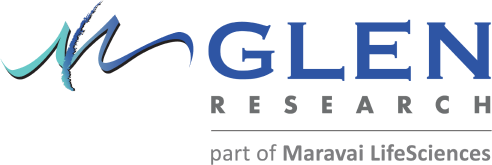Glen Report 12.14: MerMade Instruments
The MerMade DNA synthesizer is a 192 well parallel array synthesizer developed at the McDermott Center for Human Growth and Development,an organized research unit of the University of Texas Southwestern Medical Center at Dallas. Assembled instruments may be purchased from BioAutomation in Plano, TX. Their web site can be found at: http://www.BioAutomation.com
Phosphoramidite monomers are packaged in 240mL amber bottles for dissolving at the rate of 1g/20mL and are connected directly to the instrument.
All solvents and reagents are prepared to our exacting specifications to ensure the highest synthesis efficiency and are passed through a 0.2 micron filter during packaging to eliminate particulate contamination.
Tetrazole in activator solutions is typically at a concentration of around 0.475M, which is close to saturation in acetonitrile. In parallel synthesizers, there is a good possibility that tetrazole will crystallize on tips. This situation would lead to termination of flow which is bad in itself but, even worse, the blockage may be temporary. A solution to this problem is to use 4,5-dicyanoimidazole (DCI) as activator. DCI is typically used at a concentration of 0.25M in acetonitrile which is far below its saturation level at greater than 1.1M.
Regular 500Å supports may be used to fill the wells. However, this requires each plate to be prepared with each nucleoside accurately in all wells. A universal support clearly removes the need for four specific supports and makes preparing plates straightforward. Our universal support has been used in this type of synthesizer. The conditions to eliminate the terminal phosphodiester linkage entirely to 3'-OH are very forcing (e.g., ammonium hydroxide at 80°C for 8 hours minimum). However, the use of ammonium hydroxide for 6 hours at 55°C gives around 50% 3'-OH and oligos prepared this way are perfectly usable sequencing primers. For more stringent applications, the use of 0.4M sodium hydroxide in aqueous methanol gives 100% 3'-OH in 0.5 hours at 80°C. The universal Q support allows cleavage of the oligos from the plate in 2 minutes.
See our catalog for pricing information.
- Glen Report 12.11: Oligonucleotide Dendrimers: From Poly-Labelled DNA Probes to Stable Nano-Structures
- Glen Report 12.12: TOM-Protected Minor Base RNA Phosphoramidites
- Glen Report 12.13: Poly-Pak Purification of Labelled Probes
- Glen Report 12.14: MerMade Instruments
- Glen Report 12.15: More Novel Monomers: Nucleoside α-Thiotriphosphates, 5-Hydroxy-Methyl-dU, Dabcyl Products, and a Highly Fluorescent Nucleoside
- Glen Report 12.16: Product Update - Which Chemical Phosphorylation Reagent?

